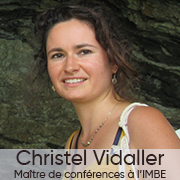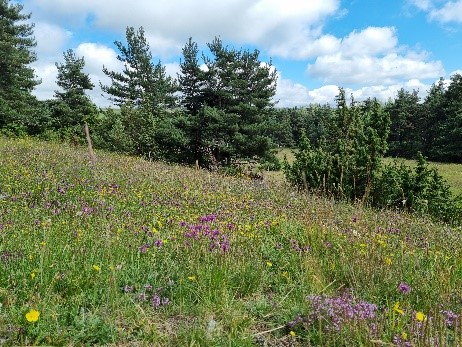[Portrait] Christel Vidaller, Senior Lecturer in Ecology, Population Dynamics and Genetics, Conservation and Restoration
What is your research about?
My research focuses on population and plant community dynamics in a restoration ecology context.
The main objectives of my research are to understand the factors that limit the resettlement of plant species, through a multi-scale approach and by taking into account different ecological processes such as biotic interactions (grazing, soil fauna...) and abiotic disturbances (fire, drought...).
The results of this research are then applied to the conservation or ecological restoration of ecosystems disturbed and/or degraded by human activities.

What are your current scientific activities?
In the context of of a research projectI have sought, in collaboration with Thierry Dutoit, to find out which ecosystem services had already been identified in such common environments as intensively cultivated fields or artificial grasslands. (see article : Cultivated fields and artificial meadows: when 'ordinary' nature is at our service (theconversation.com)).
To this end, we have carried out a study, soon to be published in the journal in Agronomy for Sustainable Development. This research should help to better integrate "ordinary" common nature into conservation-restoration mechanisms and to include it in the avoidance-reduction-compensation sequence of impact studies.
Why did you choose to work in academic research?
First of all, because of a passion, since I was very young I have always been very curious to understand how nature works. So I followed a path in this direction which allowed me to learn and experience research in ecology and since then I have never left it.
I also really like the idea of sharing and passing on my knowledge.
I also hope, in my own way, to contribute to the preservation of nature through my research.
What advice would you give to students who want to do research?
I advise them to gain experience by doing internships in different fields to find out what they really like. Indeed, the data analysis part, the writing of articles, the fieldwork in ecology ... do not necessarily appeal to everyone.
And then, not to give up if they like it, if they are passionate about it, even if they do not necessarily have a linear path, every experience is a strengthAnd above all to keep their enthusiasm intact.
What object or image from your business best illustrates you?
Natural environments. Indeed, mathematical models, genetic and statistical analyses... are great tools to help us answer our research questions, but they are nothing if we lose the biological sense and the experience in the field.

Lozère

Plaine de Crau

Bagaud
The portraits
Mis à jour le 22 December 2022